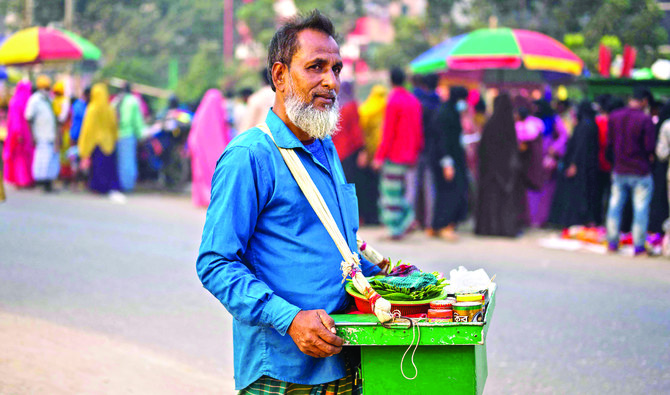Rohingya refugees said on Wednesday they had lost their sources of income and daily necessities in Cox’s Bazar, the world’s largest refugee settlement, as Bangladeshi authorities demolished over 2,000 of their “illegal” shops.
Bangladesh hosts over 1.1 million Rohingya who fled neighboring Myanmar during a military crackdown in 2017. Most of them live in dozens of camps in Cox’s Bazar, a coastal region in the country’s east.
Some makeshift shops serving the refugee community have been closed down by law enforcement for various reasons, including the trade of illegal products, but such operations were limited until last month.
Over the past few weeks, more than 2,000 shops were bulldozed, as authorities in Cox’s Bazar say they are trying to clear the way for new homes as the number of refugees continues to increase.
“Works are underway in the vacated land for building homes and health centers for the Rohingyas,” Shamasud Douza, additional refugee relief and repatriation commissioner, told Arab News, adding that the UN High Commissioner for Refugees and other groups are already supplying the community with aid.
“The Rohingyas are not allowed to run any shops and conduct business here,” Douza said. “The demolitions of these illegal shops are a part of our regular activity which we have been doing (from) time to time since 2018.”
This is the first occasion, however, that so many shops have been removed by the authorities in one go.
Mohammad Alamin, who used to have a shop in Ukhia camp, said he was left with no means to support his family.
“We receive 13 kg of rice for each member of the family in addition with edible oil, lentils, salt, sugar, onion, etc. But the family needs many other things to survive, for which we need some cash. Without having any livelihood scopes, how can we survive?” he told Arab News.
“I used to run a small shop selling tea, cookies, betel leaf, etc. But it was bulldozed on Dec. 8. I used to make a daily profit of around $3 per day which was a big support for my seven-member family.”
“We receive 13 kg of rice for each member of the family in addition with edible oil, lentils, salt, sugar, onion, etc. But the family needs many other things to survive, for which we need some cash. Without having any livelihood scopes, how can we survive?” he told Arab News.
“I used to run a small shop selling tea, cookies, betel leaf, etc. But it was bulldozed on Dec. 8. I used to make a daily profit of around $3 per day which was a big support for my seven-member family.”
Nobi Hossain, whose vegetable shop was also demolished, said that without local stores, staple items were not available to the community.
“There are many daily necessities which we need to buy. If we can’t run these small shops, from where we will source it?” he asked. “This type of initiative by the authorities will only increase our miseries.”
The recent demolition push has also raised concerns over the pressure it may create on Rohingyas in Cox’s Bazar to relocate to the controversial camp on Bhasan Char, a flood-prone island some 68 km from the mainland.
To take pressure off Cox’s Bazar, the Bangladeshi government has, since December 2020, sent 20,000 refugees to the island, with plans for 100,000 in total. Authorities say refugees have more opportunities to earn a livelihood on Bhasan Char, where they can engage in farming and fishing.
“This initiative may create some sort of pressure on the refugees, which (will) ultimately drive them … to the island,” prominent Bangladeshi human rights activist Nur Khan Liton said. “If thousands of Rohingyas live there, naturally they will require some sort of small things. If they are not allowed to run small shops within the community, it will put them in trouble.”
“We should keep in mind that these Rohingyas are refugees here and their issue should be dealt with a more humanitarian perspective, until they make a safe repatriation to their homeland with due dignity and honor.”

